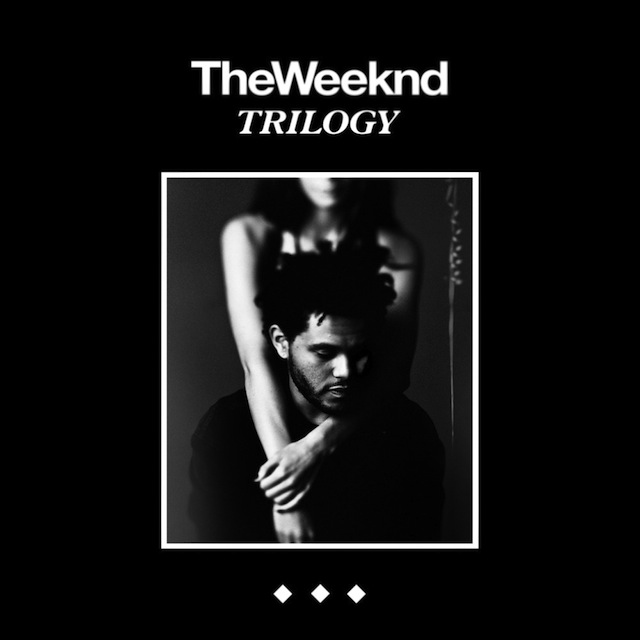Abel Tesfaye is a man out of time. The Weeknd straddles the line between 20th and 21st century sensibilities, melding the problems, drugs, and music of both into a project that seems very of-the-moment and coyly referential at the same time. The Weeknd’s pharmaceutical generation ennui calls back to both rave culture pill mania and Southern promethazine worship, and the music doses ‘80s sophisti-pop and ‘90s R&B slow jams with traces of trap, EDM, and indie rock. While the music first disseminated into the music-loving public’s consciousness through an impossibly web-savvy shell game, Abel’s controlled trickle of new music created a series of mass simultaneous listening events around each new “mixtape” ripped straight out of the pre-internet monoculture. The Weeknd’s trek from shadowy internet entity to sought-after major label feature artist and festival circuit draw might be complete, but he left us a document of the ride in Trilogy, a brashly remastered box set of 2011’s House of Balloons, Thursday, and Echoes of Silence featuring a handful of bonus tracks. This kind of remaster campaign is normally reserved for albums that have had decades to sink into the national consciousness as is, introducing a shock-of-the-new, hearing-it-again-for-the-first-time element, and while the oldest of the Trilogy material has only been around for a year and a half or so, the differences in the new mixes can still be jarring.
Abel’s vocals are up front at all times now, and all of the backing tracks are imbued with a widescreen clarity. Drums are turned way up across the board. The defiantly rockist House of Balloons comes out sounding more electronic, most noticeably on “Wicked Games” and “House of Balloons/Glass Table Girls,” whose programmed drums now overpower more organic elements in the mix. The shambolic chain gang stomp that anchors Thursday’s title track comes to the fore, and the same tape’s “Life of the Party” further accentuates the Reznor-esque industrial clang and clatter of the percussion. Echoes of Silence’s “The Fall” is transmogrified from “Cry Little Sister” tribute to a glacial, Gothic shoegaze blowout. The stately boom bap of “Same Old Song” is rendered sharper and more metallic. The new mixes aren’t always definitive (especially since House of Balloons’ “What You Need” loses the Aaliyah sample that absolutely made the song), but when they make quirky flourishes like the horn section in “The Birds Pt. 2” or the disembodied robot harmonies in “Gone” suddenly devastating, they more than justify a second trip to Abel’s abyss.
That is what this is, after all, is a graceful swan dive into the abyss. Played in sequential order, The Weeknd’s triptych reveals connective thematic tissue not evident upon ingesting each piece separately over a year. Early on, there’s a kind of innocence about House of Balloons’ relentless hard partying and sexual impropriety. But tales of partying with the blinds closed after the sun comes up and stumbling out of cabs after dawn have become something more sinister by the end of Thursday, whose “Gone” and “Rolling Stone” find the narrator partying as a way of coping, and obsessing over seratonin levels. By Echoes of Silence, the using is self-destructive, and the sex, almost Faustian, as evidenced by a tone-setting cover of Michael Jackson’s “Dirty Diana” and “Initiation,” a dubstep tinged “Ain’t No Fun If The Homies Can’t Have None” for the new millennium that is delivered with none of the humor of the original. Echoes of Silence’s title track closes out the set on a nakedly mournful note of rejection. On a certain level, Trilogy is the story of a young man losing his morals, his sobriety, his dependence, and finally, his appeal to the opposite sex.
Trilogy takes one of the more singular bodies of work of the new decade and gives it a very modern bout of premature re-evaluation, image curating and real-time mythologizing, but unlike the wave of gratuitous album rerelease packages flooding the market every fourth quarter, we get revealing new mixes, enticingly stark packaging and artwork, and a couple of quality bonus tracks out of the deal. It goes to show that Abel and company’s genre-busting vision of R&B was even more deliberately charted out than it appeared at first pass. That one of the more genius new artist rollout campaigns in recent memory should result in over a hundred thousand units sold of a trio of releases that were given away for free a full year prior goes to show that The Weeknd might not have mystery on his side anymore, but he does have a fully formed musical identity and a massive, dedicated fanbase to fall back on.


